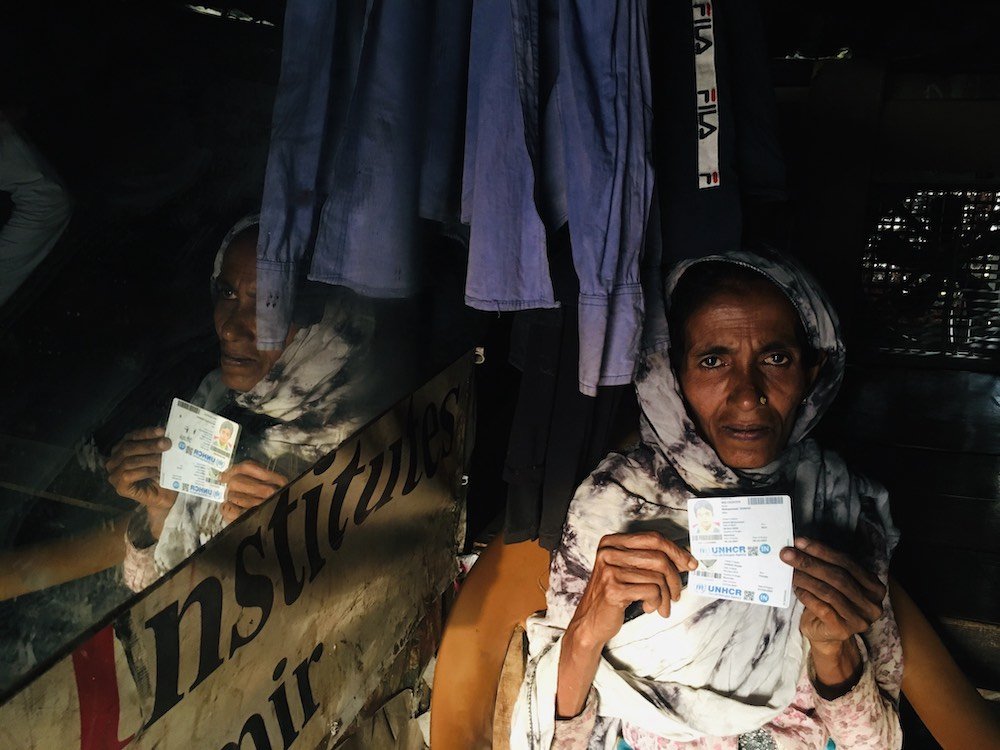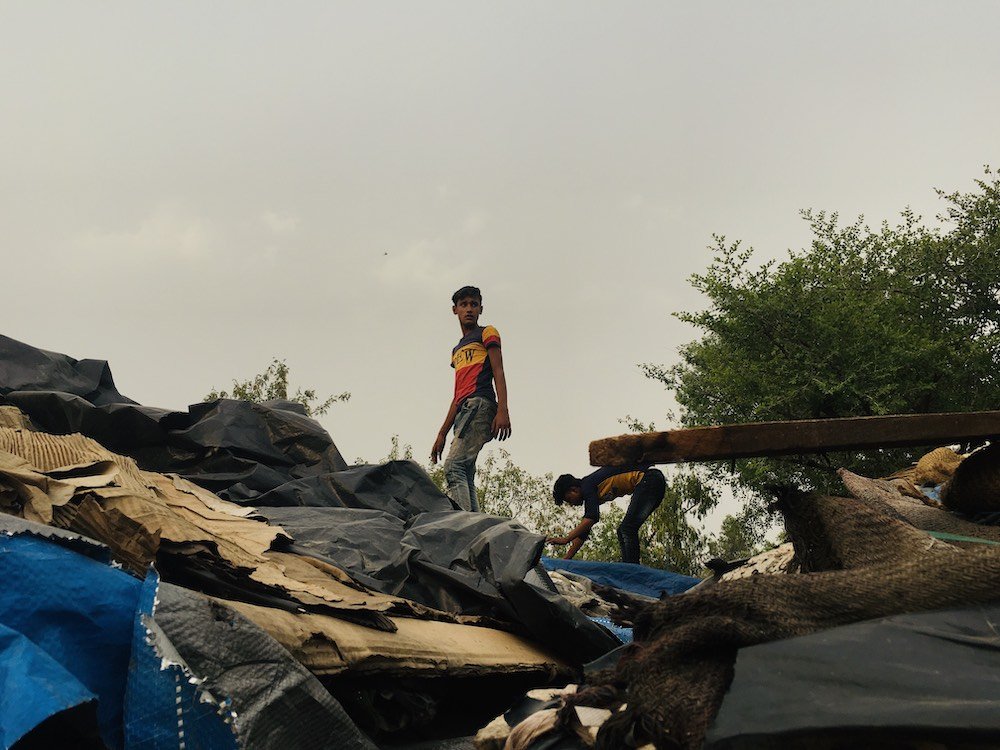With Parents In Detention Centers, Rohingya Children In India Face Uncertain Future
The Rohingya refugee camp in Kiryani Talab, Jammu. Photo by Shadab Farooq.
JAMMU, India— Since this is 4-year-old Noora's second Eid al-Adha — an Islamic holiday meaning “Feast of Sacrifice” — without her parents, she is sad and doesn't want to celebrate. Her older sister, Haleema, 12, does her best to fill the void, but Noora wonders aloud, “until when?”
“I lie to Noora by telling her that parents have gone to get her a big doll and will return soon, but as they've been taken for two years, no one in the camp believes they will ever return,” said Haleema.
Later Noora turns to me, a reporter, to ask, “Do you know where my parents are?”
On March 6, 2021, Noora and Haleema’s parents — Mohammed Ibrahim, 45, and Sajida Begum, 33 — were sent from Jammu’s Kiryani Talab Camp to a jail that had been turned into a detention center in Hiranagar, a town in the Kathua district of Jammu-Kashmir.
Noora, 4, with her sister, Haleema, 12. Photo by Shadab Farooq.
At least 40,000 Rohingya refugees live in refugee camps in Jammu, Hyderabad and New Delhi, according to the United Nations refugee agency. They fled persecution in Myanmar by crossing the border into India. Unlike many other nations, India did not sign the agreement of the 1951 United Nations Refugee Convention and has no national refugee protection policy. However, in 2021 the Supreme Court of India blocked an order to deport Rohingyas back to Myanmar, where they have faced a series of ongoing persecutions and killings by the military.
While Rohingyas — a Muslim and ethnic minority from Buddhist Myanmar’s Rakhine state — have experienced persecution for decades, a new wave of attacks erupted in 2012, which further intensified in 2015, soon after the southeast Asian country held its first democratic elections in 25 years. Persecution reached an unprecedented level in 2017, prompting the United Nations to call the crisis a “textbook example of ethnic cleansing.”
About 30,000 Rohingyas have been killed before they could flee, and nearly 20,000 girls and women have been raped, said Yangon-based Rohingya activist Sam Naeem, also known as Khin Maung Myint.
READ: On World Refugee Day, An Overview Of A Persecuted Muslim Minority
During a hearing on March 26, Solicitor General Tushar Mehta argued on behalf of the central government that Rohingyas are not refugees but “illegal immigrants.” Mehta added that the government was verifying their nationality with Myanmar. “We are always in touch with Myanmar and if they confirm … then they can be deported,” Mehta said.
According to Noor Habba, who is now caring for Noora and Haleema, Indian authorities have taken many children’s parents to Hiranagar.
"I have four kids and I'm taking care of these two too,” she said. “What can I do? Today it's Noora and Haleema; tomorrow it could be my kids.”
Hasna Begum, 68, with her grandchildren, Shahid, 10, Sabu, 9, Sadiq, 3 and Zubair, 7. Photo by Shadab Farooq.
Mohammed Shahid, 10, said he kept pleading with the police not to send his parents to the Hiranagar detention camp.
"Police stole my parents, saying they were being taken for a (COVID-19) test and would be back by evening, but they haven't returned since then,” Shahid said.
Shahid’s grandmother, Hasna Begum, 68, now cares for Shahid and his four siblings.
Hasna Begum said that the kids have stopped eating and playing with other kids outside because they miss their parents.
“I continue to be ill, and God forbid, I could depart this world at any time,” she said. “I worry about who will care for my grandkids when I pass away."
Hasna Begum, 68, shows the UNHCR (U.N. refugee agency) identity cards of her son and daughter-in-law, who are being held at Hiranagar detention center. Photo by Shadab Farooq.
Police took Mohammed Hussain, 40, to the Hiranagar Camp but returned him to the Kiryani Talab Camp in Jammu after two days. He estimates that there are about 30-35 kids living by themselves in Jammu’s Rohingya Camp.
"I think it's a blessing that I was brought back,” he said.
“It is becoming difficult to care for these children,” said Anwara, 19, a mother of one who also looks after the four children of parents who are being held in the Hiranagar detention center.
"We definitely need assistance so that these children living without their parents get good care,” she said, tallying the 1,600 rupees ($20) a month she needs to feed everyone and pay rent.
Zahid Hussain, 14, recently visited his parents at the Hiranagar detention center.
"I wasn't even allowed to touch my parents,” he said. “I could only see them because there was a large glass between us. … All I wanted to do was hug my mother, but I couldn't.”
Zahid, 14, with her sisters, Parweena, 9, in the center and Yasmeen, 8, on the right. Photo by Shadab Farooq.
Zahid’s youngest sister, Yasmeen, 8, walked up as I was speaking with Zahid and inquired, “Why have you come here?” I responded, “I'm here to give you an eidi,” referring to the gift that is given to children during the Eid holiday.
"My parents are all I want for Eid,” she said.
READ:With No Mosque, Rohingya Refugees Worship In Their Homes
India has defended its crackdown on Rohingya refugees by claiming that because it is not a member of the 1951 U.N. convention that outlines refugees' rights, the nation has no legal responsibility to protect them.
The Hindu-first Bharatiya Janata Party ruling India and organizations supporting the BJP have campaigned on promises to deport Rohingya Muslims.
In a report, Ashok Kaul, a BJP politician in Jammu, said, “They came here from (a) far away land and we cannot allow them to settle here. This is a security threat for us.”
Due to the fear of future detentions, three schools that were being run in various regions of Jammu for Rohingya students have been temporarily closed. Photo by Shadab Farooq.
“We will pack them in vehicles and send them back,” Koul said. “The process to deport them will continue. Our party’s stand is clear on it.”
Nirmal Singh, a senior BJP leader and former deputy chief minister of Jammu-Kashmir, helped form a committee to look into how Rohingyas should be deported while he served as chief minister.
Shadab Farooq is an independent journalist based in Delhi and a graduating student at Jamia Millia Islamia. He has reported for People Archives of Rural India, The Wire, Two Circles Network and Island Journal, among others.







